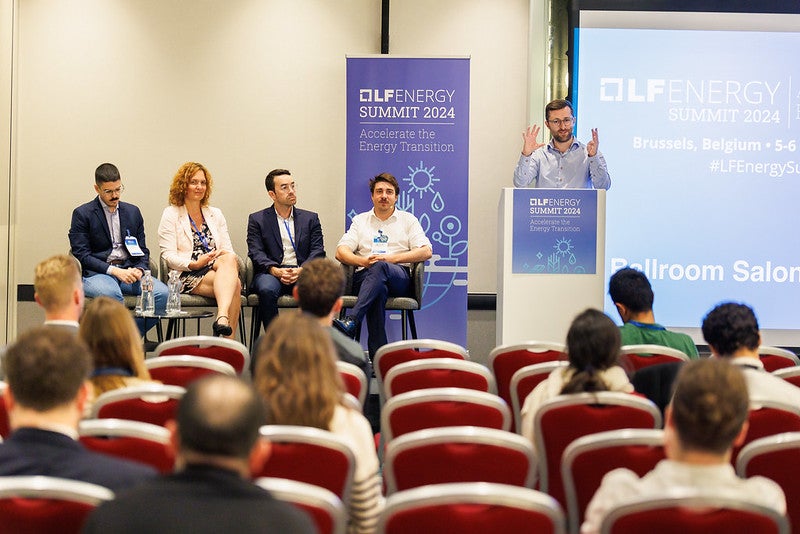LF Energy Summit Recap and Video: What’s Clean? How Granular Data Holds the Answers to Clean Electrification and Trade
At LF Energy Summit 2024 in Brussels, a key panel titled “What’s Clean? How Granular Data Holds the Answers to Clean Electrification and Trade” was hosted by Killian Daly of EnergyTag, with panelists Eloi Febrega Ferrer (Flexidao), Nicolas Bernhardi (Energinet), Devon Swezey (Google), and Katrien Verwimp (Association of Issuing Bodies). The discussion centered on how granular electricity data can transform clean electrification and trade, offering insights into clean energy markets, carbon accounting, and the need for new standards. A summary follows, and the full video is available at the end of this post.
Defining “Clean” Electricity
Daly opened the session by posing a critical question: What constitutes “clean” electricity consumption? Today, electricity carbon accounting is often generalized over broad timespans (e.g., a year) or vast geographical regions, leading to misleading conclusions. For instance, claiming to use renewable energy at night, powered by solar, or from distant regions can distort the true carbon impact.
The key to solving this, Daly explained, is adopting granular data, which involves tracking electricity generation and consumption in real-time within specific grids. This more detailed accounting would better reflect clean power use and support the growth of demand-side flexibility and storage solutions. Daly emphasized that granular energy tracking systems, like those promoted by EnergyTag, are vital for achieving clean electrification.
The Role of Granular Certificates
To support this, granular certificates are essential. These certificates serve as digital twins to the physical power system, enabling real-time tracking of energy sources. Panelists stressed that such systems must ensure accountability and avoid double counting, a recurring issue in today’s energy markets.
Princeton, MIT, and other institutions have shown that granular tracking can send more targeted signals for renewable energy build-out and flexible supply, like storage. Daly pointed to the emerging regulatory changes in the European Union, where renewable hydrogen rules now mandate that electricity used for hydrogen production must be sourced within the same hour and grid as consumption.
Importance of Common Standards
The need for common standards across global markets was another significant theme. As Verwimp of the Association of Issuing Bodies (AIB) explained, harmonizing standards ensures consistent and trustworthy energy tracking. Without this, Europe and the U.S. could diverge on how they define and certify clean hydrogen, steel, and other sectors, complicating international trade and carbon accounting. Verwimp highlighted that harmonized systems also prevent double counting, a risk that grows as energy tracking integrates into more regulations.
Driving Corporate and Industrial Decarbonization
Swezey from Google illustrated how granular data is shaping corporate energy procurement. Google, a major energy consumer, aims to achieve round-the-clock clean energy use by 2030 by aligning its energy consumption with local, hourly renewable generation. Swezey discussed how Google collaborates with partners like Flexidao and EnergyTag to pilot and scale this approach globally, aiming to push the entire industry towards more transparent and granular energy accounting.
Energinet’s Bernhardi discussed the importance of granular tracking from a system operator’s perspective. Denmark, with its high renewable energy penetration, has been a testing ground for new energy tracking systems. Bernhardi highlighted the need to establish functional standards and demonstrate their real-world applicability to further drive the energy transition.
Enabling Granular Matching and Industrial Transformation
Ferrer from Flexidao discussed the challenges and opportunities of enabling granular energy matching. He explained that while tracking energy consumption is technically feasible today, aligning it with granular energy certificates and carbon emissions data requires sophisticated solutions and collaboration. Flexidao is already working with companies to integrate these systems, proving that significant volumes of energy can be tracked in this way.
The session closed with reflections on the global implications of granular energy tracking, particularly outside the OECD regions. The panel acknowledged the challenges in data availability and utility readiness in developing markets but emphasized the importance of setting standards now, especially as mechanisms like carbon border taxes come into play.
